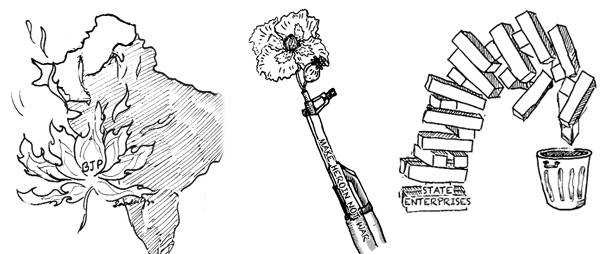
Taxpertise

Sir,
In order to restructure the federal tax administration, the government should appoint a retired chairman of the federal department of revenue, especially someone who belonged to a tax service, as a member of the Taxation Reforms Commission. Such a person would be able to make valuable a contribution because of his insight on the nature of the tax machinery in Pakistan and its personnel.
In this regard, it is pertinent to consider the following view of James B Hom, who was the Director of The Institute of the Tax Administration, Los Angeles:
“It is our thesis that the traditional approach to a tax system – tax policy, law, and administration – has serious deficiencies for the developing world. Primary concerns should shift to the area of administration. If one cannot administer a policy or a law, then all of the other efforts involved are an exercise in futility. Not only will such efforts fail to bring in the desired revenue, but such an approach will, in due course, bring disrepute to the fiscal authority and the government”.
Taraq Jazy,
Lahore.
Corruption chronicles
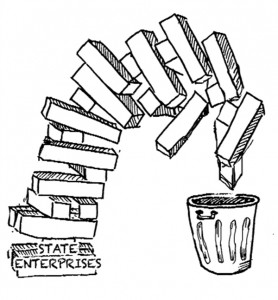
Sir,
This is in response to reports about the shutting down of Pakistan Steel Mills, and the collapse of numerous state-owned enterprises. The unfortunate irony is that while the industrial empires of the political elite and the corporate interests of powerful public servants – including tax exempted welfare foundations owned by sensitive institutions – have profited and grown exponentially, almost all state-owned enterprises are either technically insolvent or on the verge of bankruptcy. It is not democracy we should blame, but the sick mindset that needs to be changed drastically, to enforce the rule of law where men, irrespective of the post they hold or their status, submit to the supremacy of the constitution.
It is not that those at the helm lack the ability to select people on merit, as they do for their own business ventures, but the mindset that has evolved over two centuries of living under occupation that state funds, resources and assets are perks of power to be doled out or plundered at will, and that tax evasion is not a heinous crime.
While private-owned businesses of members of the ruling elite hire the best available qualified specialists for their corporate ventures, they consider it kosher to reduce state corporations and organizations to dumping grounds for unqualified cronies or dedicated to the welfare of retired officers.
Pakistan’s scarce finances that could have been invested for development of human resources and nation building are being wasted by design and ill-intent of those who wield power.
On August 11, 1947, Quaid-e-Azam stated that “one of the biggest curses from which India is suffering is bribery and corruption, that really is a poison. We must put it down with an iron hand”. He was referring to the institutionalization of corruption and bribery by the Colonial Raj, who bribed Indian civil servants and members of police and other security agencies through allotment of plots, titles and grants, to buy their loyalties and serve the national interests of the United Kingdom.
The Raj also encouraged political parties in Punjab to serve occupation in return for lands and titles. This practice of doling out state assets to paid servants of the state, or political opportunists, was never allowed in the UK.
It is time to reform. We must fulfill the constitutional obligation to make appointments on merit.
Tariq Ali,
Lahore.
Faith and family

Sir,
The Imam of the Jama Masjid of Delhi, Sayed Ahmad Bokhari, has invited Prime Minister Nawaz Sharif to attend the ceremony of the passing of the Imamate to his 19-year-old son. About 1,000 dignitaries, both Muslims and non-Muslims, will attend the event.
We have heard of dynastic kingdoms, dynastic politics, and dynastic family fortune, but it is strange and shocking that even the Imamate of a mosque as revered as Delhi’s historical Shahi Masjid becomes a family affair.
Are there no religious scholars amongst the 27 million Muslim population of India that are qualified to lead prayers, give sermons and pronounce fatwas on impotant Muslim issues? Why has the Imam arrogated these tasks to his own family? Is it appropriate that a teenaged Imam chosen by his own father will be leading prayers and advising Muslims many of who are far more advanced than the lad in matter of age, experience and knowledge of religious matters?
Sayed GB Shah Bokhari,
Peshawar.
Kabul’s lost drug war
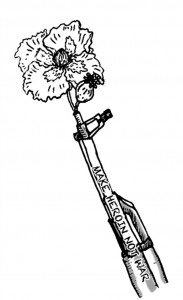
Sir,
With a new Afghan president in office, there is an opportunity to restrengthen Kabul’s fight against narcotics. But before that, we need to recognize and address the mistakes of the past. The share of opium in the Afghan economy had increased drastically during the time of Soviet occupation, and with the outbreak of the civil war after the fall of the communist regime in 1992, drug producing and trafficking became the biggest contributor to the Afghan GDP. One of the most upsetting developments recently has been the enormous surge in production of opium poppies which, according to the UN and John Sopko, the US Special Inspector General for Afghanistan Reconstruction, has hit “unprecedented” heights.
This happened despite the fact that United States invested more than $7 billion to combat poppy cultivation and to develop the Afghan government’s counter narcotics capacity. But opium poppy cultivation levels in Afghanistan hit an all-time high in 2013, hitting 209,000 hectares, surpassing the 2007 peak of 193,000 hectares.
In fact, all of the fragile gains that the Afghan society has made over the last 12 years on women’s issues, health, education, rule of law, and governance are now in danger of being wiped out by the narcotics trade which not only supports the insurgency, but also feeds organized crime and corruption.
Rural Afghan farmers are finding the cost of production for poppy very low because of affordable deep-well technology. This technology was brought to Afghanistan over the past decade had enabled Afghans to turn 200,000 hectares of desert in the south-west of the country into arable land, much of which is devoted to poppy production. But other factors are also contributing in opium boast mainly growing insurgency, poverty, lack of rule of law, administrative corruption, weak government and warlordism.
An alarming fact is that poppy cultivation has shifted to areas where government presence is broadly supported and security has improved, from more remote and isolated areas where governance is weak and security is inadequate. Nangarhar had been considered a model for successful counterinsurgency and counter narcotics efforts and was deemed “poppy free” by the UN in 2008. It saw a fourfold increase in poppy cultivation between 2012 and 2013.
We should focus on rural development and providing farmers with other cash corps. Any progress in counter narcotics in Afghanistan will take a lot of time may. Rural development programs often take several decades.
The new president Ashraf Ghani has vowed to fight corruption. He also needs support to tackle the drug issue before it constitutes a major source of income for other international terrorist groups as well, such as the Islamic State of Iraq and the Levant in Iraq and Syria.
Dr Florance Ebrahimi,
Sydney.
Escalation trap
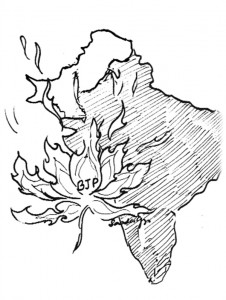
Sir,
The recent incidents of heightened tensions on the Line of Control and the Working Boundary with India are the third major escalation since the 2003 ceasefire. The first was in 2008 after the Mumbai attack, while the second occurred in 2012-13 when India alleged that the Pakistan Army had killed two of its soldiers and beheaded one. In all the three confrontations, the pattern of escalation remained the same.
In 2008, after the Mumbai attack, the Indians won sympathies of the world community; so its main reliance was on the international diplomacy aimed at pressuring Pakistan to accept Indian demands. During the 2012-13 escalation, the India army tried to provoke the Pakistan Army and put pressure on Islamabad, going to the extent of warning the people of Kashmir of a possible nuclear attack through newspaper advertisements suggesting precautionary measures. Practically however, India kept the escalation restricted to the LoC, and that too to a specific sector.
With this background, the present escalation is different from the earlier two escalations, both in character and scope. So far, the escalation has mainly been confined to the Working Boundary. Interestingly, the Indians have not come up with any specific reason other than saying that Pakistan started the crossfire. Similarly, on the Pakistani side, the director general of the Punjab Rangers has termed the present escalation a “mini war” but has not given a rationale for the increased hostilities.
Of late, the Indian strategic community is increasingly presenting a view that Pakistan’s nuclear weapons do not prohibit New Delhi from initiating military operations in response to the aggression traced back to Pakistan. On October 12, 2014 a retired Indian lieutenant general, Raj Kadyan, told the Capital Talk show: “the world is not any more interested in Kashmir and India needs to call Pakistanis’ bluff that there is no space for war between the two nuclear armed nations.”
Therefore, the escalation needs to be seen in four different ways. Firstly, the BJP, being from hyperrealist school, prefers dealing with the security threats by flexing military muscles – India is in search for a position of military advantage. Secondly, domestic politics, elections in Maharashtra and Haryana, require BJP to show highhandedness in its dealing with Pakistan. Thirdly, a strategic signaling, that India can handle Pakistan irrespective of international consequences. Fourthly, this could be a plot to divert Pakistan army’s attention from Operation Zarb-e-Azb.
Normatively, these drivers sound coherent but experience suggests that such a behavior could lead India to an escalation trap. India, under BJP, is fast undergoing transformation in its strategic thinking – from Gandhian to Kautilayan school of thought. The emerging parabellum culture will encourage the Indian strategic community to perceive force as the preferred route to security. India, in future, is expected to leverage military power differential vis-à-vis Pakistan to operationalize its ‘Compellence’ strategy. And it is not being able to understand that such a strategy does not ensure ready-made desirable outcomes, and sniffing a space for war in such a manner will pilot it towards unintended consequences.
Rehan Mushtaq,
Islamabad.
Wake-up call
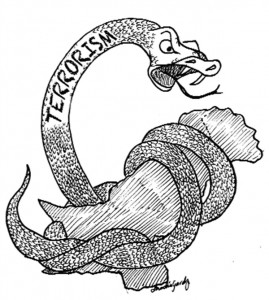
Sir,
The brutal attack on innocent unarmed citizens of Pakistan, who had thronged to Wagah to watch the flag-lowering ceremony with India just 500 yards from border, should awake us to the ugly reality that the enemy we face is against the state of Pakistan, has no sense of remorse, and holds no regard for the teachings of humanity and Islam that forbid murder. If only we had been wise to notch this snake in its infancy, this country would have been more secure than it is today. This attack should also jolt us out of our deep slumber so that we can accept our security lapses and take concrete measures to win this war against terrorism.
This is a war for very survival of Pakistan and no individual or institutional vested interests must be allowed to prevail. Failure is not an option against these terrorists, nor is the policy of restraint or reconciliation. They must be made to surrender, be debriefed by professional expert counselors, and then rehabilitated if possible, or condemned for life imprisonment without parole, or given death penalty if found involved in murder.
Given the frequency of successful terrorist attacks on our vital security installations, it is time that we enforce a secure sterile zone around sensitive areas, free of commercial or housing projects, with no free access to the general public. Why has permission been given for private residences under the garb of farmhouses, shops, and restaurants in such close proximity to what constituted our second line of defense during the 1965 and 1971 wars? National security should have a priority over commercial and individual interests, especially near the border or near other important security infrastructure.
We must also realize the capability of these terrorist outfits to flare up tensions by carrying out such attacks against our neighboring countries from within our territory, and we must take concrete measures to stop them.
We must also reconsider the flaws in our long term security and foreign policies and set them on the right course, after an in-depth brainstorming by qualified experts in relevant fields. We must ensure that we do not make mistakes that will have consequences for ourselves in the long run, such as our failed strategic depth doctrine, which ended up making our internal security more fragile.
Ali Malik,
Dubai.

